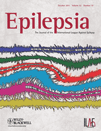Replication of association between a SCN1A splice variant and febrile seizures
Summary
In the present study, we assessed a SCN1A single nucleotide polymorphism (SNP) (rs3812718, IVS5N+5 G>A), first analyzed by Schlachter et al. We genotyped 164 patients with febrile seizures (FS) [of those 62 adults with focal epilepsy (FEFS+) and 102 children with pure FS (Pure FS)] and 199 matched controls. Moreover, we also tested a third subgroup of 113 patients with focal epilepsy syndromes without a history of FS (FEFS−); they all were Caucasian. Our results, as in the initial study of Schlachter et al., showed an increase in the A-allele and AA-genotype frequencies in patients with FS compared to the controls, but these current differences did not reach statistical significance. Subsequently, we pooled our data with previously published Caucasian groups. No statistically significant difference was found for the FEFS−, but analyses for FEFS+ and Pure FS are significantly different compared to controls (p = 8.08 e−6 and p = 3.56 e−4, respectively). Furthermore, pooled patients with FS (FS + FEFS+) tested against those without FS (Controls + FEFS−) showed an even greater statistical significance (p = 4.82 e−8). These results reinforced rs3812718 involvement in FS vulnerability.




